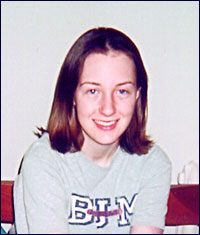 Age 16 |
 |
 Suzanne, Age 16 |
In a perfect world everyone would be safe, taken care of, loved, understood and happy. But in the world we live in, we also experience trials and tests that can make life very difficult. At some point in life, every single teenage girl will be faced with one, if not more, of the issues involving sex, drugs, abuse, relationships, eating disorders, health concerns, depression, stress, pressure, loss, pregnancy, STIs (sexually transmitted infections), etc. |
| As the world is a very diverse place, finding help that suits your needs may
be a bit of a challenge, at first. Girls from lower income families may
feel helpless, as they may not have health insurance, parents' permission,
rides or a place to go for help. Some girls may
be on the streets, selling their bodies to survive, living off of drugs,
dependent on their gang and left with little self-confidence. And some girls
may not be faced with these extremities, but only wish to keep their
problems confidential as they do not wish to burden the people around them
or may feel that their family and friends would not be supportive and
understanding. Fortunately there are places to go for help, and these health
care centers and shelters are now more available to teens than ever. Some
centers are very broad and deal with everything from broken legs to STI
testing, while others may specialize in services such as contraception methods and depression. These centers are filled with professional doctors, social workers, nurses, counselors and volunteers. Confidentiality is a top priority to ensure the patient's safety and comfort, and if the center charges you for its services, the costs are very low, especially when compared to hospitals and private practices. Because shelters and clinics have your immediate safety in mind, they may refer you to a hospital where you will receive the treatment you need. Both shelters and health centers will inform and discuss with you the options you may have, and are always ready to listen.
The best way to find out where you or a friend can get help is in your yellow and white pages. Look under headings such as "Battered Women's Center," "YWCA," "YMCA," "Adolescent Center," "Free Clinics" and "Runaway Hotlines". There are also many 800 numbers that are toll free that can offer you help from wherever you are and tell you of a center near you. On the next page are several addresses, 800 numbers and web-sites of places that can be of immediate service to you. If you have trouble finding a center you are comfortable with, contact a counselor or trusted teacher and they should be more than willing to help you out. Note, however, that law requires counselors to report to parents and other adults any problems you may have, while professional "outside" doctors, by law, are bound to strict confidentiality. Don't be afraid to ask for help or thoroughly quiz the doctors you see. If you don't like whom you're dealing with, find someone else. NOTE: All conclusions come from my own observations and train of thought, as well as the study of several statistics from: "The Health of Adolescent Girls", The Commonwealth Fund, 1997. |
| List of Help Info Statistics |
Next >> |
Home |
|